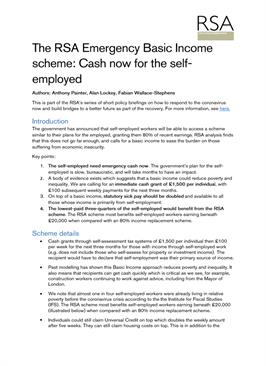This is part of the RSA’s series of short policy briefings on how to respond to the coronavirus now and build bridges to a better future as part of the recovery.
The government has announced that self-employed workers will be able to access a scheme similar to their plans for the employed, granting them 80% of recent earnings. RSA analysis finds that this does not go far enough, and calls for a basic income to ease the burden on those suffering from economic insecurity:
- The self-employed need emergency cash now. The government’s plan for the self-employed is slow, bureaucratic, and will take months to have an impact.
- A body of evidence exists which suggests that a basic income could reduce poverty and inequality. We are calling for an immediate cash grant of £1,500 per individual, with £100 subsequent weekly payments for the next three months.
- On top of a basic income, statutory sick pay should be doubled and available to all those whose income is primarily from self-employment.
- The lowest-paid three-quarters of the self-employed would benefit from the RSA scheme. The RSA scheme most benefits self-employed workers earning beneath £20,000 when compared with an 80% income replacement scheme.
pdf 904.7 KB
Contributors



Related reports
-
Make it authentic: Teacher experiences of youth social action in primary schools
Nik Gunn Aidan Daly Mehak Tejani
Youth social action brings all sorts of benefits to young people and communities. But how do teachers experience it? And what can we learn from that experience?
-
Preventing school exclusions: collaborations for change report
Mehak Tejani Benny Souto Aidan Daly
School exclusion can change the course of a young person’s life. It can have long-term implications for their health, wellbeing, and future opportunities.
-
Digital innovations in lifelong learning: a global perspective
Veronica Mrvcic James Richardson Amy Gandon Aoife O'Doherty
Digital innovations in lifelong learning: a global perspective explores the drivers that support and the barriers that limit the international reach and impact of digital lifelong learning innovations.



